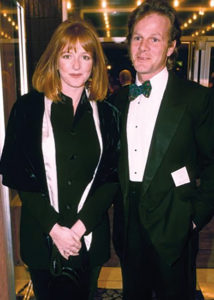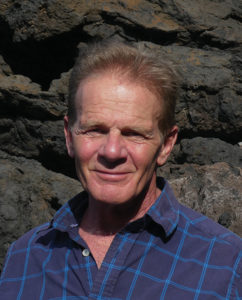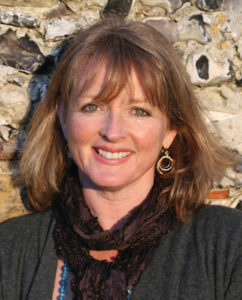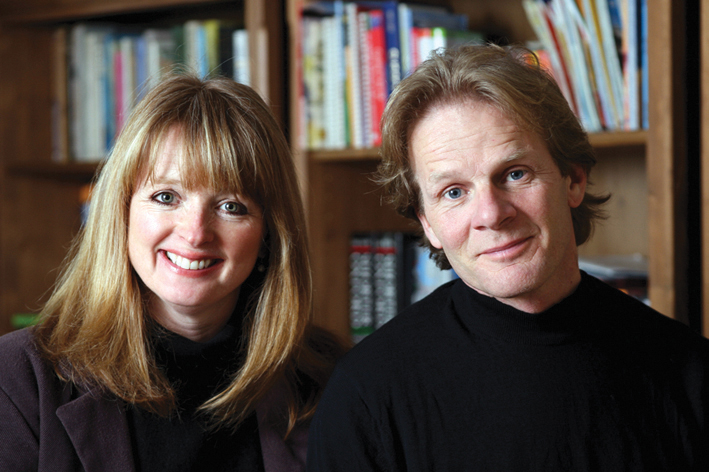
Tim Laurence and Serena Gordon pictured in 1995, the year of the first Hoffman Process in the UK
For quarter of a century, Hoffman UK has been changing lives for the better. As we celebrate our anniversary year, UK directors Tim Laurence and Serena Gordon discuss past, present and future.
We asked Tim…
You’re regularly overseas as an ambassador for Hoffman and you’ve taught the Process in many countries around the world. What is it about this work that appeals to people from so many different countries and cultures?
The Process gives us time to retreat from the world and have a look at what’s difficult to see in our day-to-day life. It helps answer the fundamental questions we all face – what is our relationship to love and to compassion? How do we love others, and how do we treat ourselves? We may have many other issues to do with building a career or raising children, but those big questions are always there just underneath.
In essence, it’s a classic ‘Hero’s Journey.’ Through thousands of years, this journey has been portrayed mythically as going into a dark forest, or to a forbidding castle, where you have to face the terrifying dragon or the evil knight. In psychological terms, it’s the journey to that inner world where undigested memories and old emotional baggage have been stuffed away. As a Hero’s Journey, the Process is both universal and timeless.
Or, to put it another (more contemporary) way, the Process does a reboot, a reset of our own brain that has got tired and fed up, and allows us to see with new eyes. We could all do with that at some point in our life.

Hoffman UK founder Tim Laurence
You worked with Bob Hoffman in the US before bringing the Process to the UK and you’re still very much involved in reviewing and updating the course content worldwide. Why is that important, and do you think Bob would still recognise the Process?
We keep updating the Process simply to use what works best. Between all the Hoffman centres worldwide, we’re continually discussing and exchanging best practice and ideas.
Sometimes, advances in scientific research need to be incorporated into the work. For instance, discoveries in neuroscience since the course began have enabled us to better understand how we form new neural pathways and therefore new behaviour. Research is also constantly emerging about learning techniques; how long people can focus on something, what types of exercises are most effective, or even how music complements a session. We’re a training organisation that enjoys being a learning organisation.
Lastly, our clients may have new issues that didn’t exist when the Process began – social media addiction is a current example that springs to mind – and we need to incorporate dealing with those.
Bob would certainly recognise the Process. Even though we may conduct it differently, we’re still playing the symphony he composed. Nobody is going to mess with the main sessions; there’s always going to be a lot about how we grew up in our families, and some of the ‘nice surprises’ are sacrosanct. It’s more about tweaking and updating, rather than radically altering.
We often talk about the Process being a lifelong journey. After 25 years, does the work we do still have the ability to surprise and challenge you, and do you still learn from it yourself?
What I’m mostly learning these days is that life’s very simple, despite my intellect rather liking complex things. Just to listen to my intuition, my spiritual self, rather than try and figure it out, is the way to have a good day. The old adage about teaching what you most need to learn does have a ring of truth. Clearly, I needed to learn about love and compassion, and then needed another 25 years of being reminded about it.
In terms of surprises, hearing people’s individual stories always turns up something new and very touching. As for challenges – well, of course – I have patterns, like everyone else, and if I didn’t get challenged, I wouldn’t be alive!
Last year you spent time running introduction events for Hoffman in Amsterdam, Kuwait, Dubai and Saudi Arabia. Where next?
Warm and sunny places, preferably! Seriously though, I go where there’s already a group of Hoffman graduates who have invited us to come and support them. That could be South Africa or India next. But I also know that to really spread this work, we’ll have to train facilitators from the UK as well as from other countries, and then let them take the Process out into the world. That’s where my focus will be in these next few years.
25 years shows tremendous commitment, stamina and passion. With all the highs and lows, what feeds you? What keeps you going on difficult days?
For me and for all of us involved, this work is a real passion – a love affair – and so it’s a giver of energy. Being in love with it feeds my heart and soul – it makes my spirit sing. And when things get really tough, I just repeat the message: ‘This too shall pass.’
What’s been your personal highlight of the past 25 years?
For the UK Process, my highlight came five years after we began, when three things happened one after another: Florence House was bought by Michelle Stevenson and renovated for us to use; we added a Process at the last minute that immediately filled up; and some switched-on journalists came to us asking ‘What’s all this we keep hearing about Hoffman?’ That was when I could relax and trust that, yes, there was plenty of help out there for the Process.
My personal ‘Me Time’ highlight was sailing across the Atlantic for six weeks and feeling the immensity, the silence, the perfection of nature. Following that, I was totally refreshed and recharged, ready to engage with the full human drama that is the Hoffman Process for many more years.

Serena Gordon, Hoffman UK Managing Director
We asked Serena…
Attitudes to personal development were very different in 1995. Was this a challenge when Hoffman UK was set up? And what changes have you noticed?
When we first started explaining about the Hoffman Process, there was no website or Facebook, Tim hadn’t written You Can Change Your Life and we had no magazine! Even doing therapy was considered ‘brave’ and very private. There was some scepticism as to what we were doing and why people would ‘have to’ go away on a retreat for a week.
Twenty-five years later, the world is in a different place emotionally. People are more willing to speak about their feelings and past experience, and it’s acceptable to want to do something to improve your life. There’s less stigma around personal growth and therapy; the majority of our clients come to us on the recommendation of a friend or family member. Looking after oneself is seen as an essential part of life’s maintenance and of valuing yourself.
Almost 10,000 people from all walks of life have now done the Hoffman Process in the UK. What do you think attracts such an extraordinary range of age, nationality and background to the course?
I love the way we attract such a diverse range of people to our courses. Each person comes for their own reason, but a common theme is the desire to move on from the past and make conscious choices about the future. This is relevant whether people are in their 20s or 80s. Our clients want to learn tools and skills to help them for the rest of their life. I’ve heard many people refer to Hoffman as laying the foundation stones upon which you can build your life.
Hoffman has a flourishing community of Hoffman graduates that you do so much to support. Why do you think this post-Process connection is so important to many people who’ve done the course?
Let’s face it, people need people to thrive and survive. Living a wholehearted life and one you can look back on with pride is a great vision to have. Being on a course with others who have shared the same experience provides a bond and friendships that will last a lifetime. People often like to stay connected afterwards, which is why we offer a variety of other workshops, meet-ups and opportunities.
We’ve recently been seeing an increasing number of businesses sending members of their staff to the Process. Why do you think this is?
It’s essential that companies look after the health and wellbeing of their employees. We welcome companies offering the Process to their staff as part of their continuing personal development; we’re accredited as a CPD provider and we’ve heard great feedback from those we’ve worked with. We also offer one-day bespoke courses where we go into companies to teach Hoffman tools for greater awareness, engagement and team alignment. We’ll be doing more of those in 2020.
In the past few years you have launched a variety of new Hoffman workshops on positive parenting, building relationships, living with addictions and you’ve added a new Process venue at Broughton Hall in Yorkshire. What’s in store for the next few years?
I am still holding the vision of providing Hoffman skills for life – from ‘cradle to grave’, building on what we have been doing, listening to our clients and responding to what society needs from us. We will be increasing the Hoffman team in order to manage our growth and exploring more opportunities in the education and charity sectors.
25 years shows tremendous commitment, stamina and passion. With all the highs and lows, what feeds you? What keeps you going on difficult days?
I’m practical and an eternal optimist. I believe in the resilience of the human spirit and I benefit from a strong connection to nature and the universe. I feed off communication with our clients; being there when they start and finish each course and still there years later is important to me. I also regularly use two Hoffman tools: our Quadrinity check in (a short meditation to listen to and align the four aspects of self: the body, emotions, intellect and spirit) and I practice gratitude and appreciation on a daily basis.
What’s been your personal highlight of the past 25 years?
Tough question with lots to choose from, but I’d have to say the births of my two sons in 1995 and 1997. They were growing up alongside Tim and me as we were growing the Hoffman business. It fills me with pride to see all three flourishing. They are each unique, but fundamentally they have strength, resilience, humanity and a special sort of sweetness.

Serena Gordon and Tim Laurence in 2008






 Sign up to receive monthly newsletters from Hoffman
Sign up to receive monthly newsletters from Hoffman